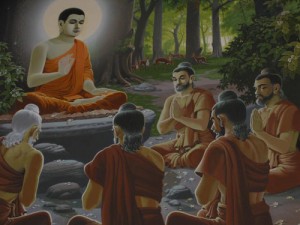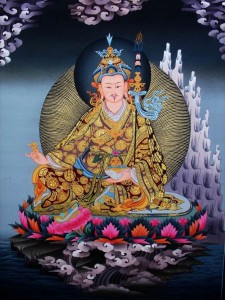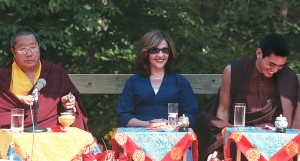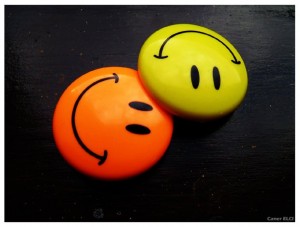The following is an excerpt from a teaching by Jetsunma Ahkon Lhamo called “This Time is Radical”
When I see patterns repeat themselves and when they come to no good, I wonder what’s going on. And when I see patterns externally repeat themselves and display themselves, then I say, “Oh, this is the dance of phenomena, and there’s something to be looked at here.” And when I look at this display of phenomena, it seems to me that if we read the paper, listen to news, if we have our antenna up at all, and if we are managing not to remain so self-absorbed that we are not aware of the outside world, we may have come to understand that the world is changing very rapidly, very quickly; and that many things that groups and people who cared about social justice and about the environment and about things that us tree-hugging liberals, or some of us tree-hugging liberals care about, these warnings have come full circle and have come to be true.
I find us now in a country where our liberty has been pretty smacked around and our potency as a society is like a castle built on sand. The sand is rushing away from under us. It’s as though whatever foundation kept the people together, even in just a materialistic and commercial way, is dissipating. I see good work for good honest people going overseas. I see Americans left with shit labor. And I see people cross the border to try to make their families wealthy or make their families eat. And there’s so much hatred that we can’t understand why it is that people would want to do that. Of course to me, it is very understandable why a person would wish to feed their family.
And I also think long before lines were drawn, the people were still there; and they moved back and forth any way they wanted to. So when we draw lines, we have to have a little bit of respect for what is natural, what has always been, and what is true. Even on a less important level, the way that we insist upon thinking these days, even animals can’t cross into their own habitats; and many of their habitats are being destroyed just for the sake of boxing ourselves in. And then after we do that, we send all of our jobs overseas. That’s just America. Check out the rest of the world. As things go, it’s not too bad here yet.
Why am I talking about this ordinary stuff from the throne on ten million day? It’s to make a point. I wish I could yell it loud enough so that you would really hear me with your whole heart and whole mind and whole being when I tell you that this time is radical. This is a time of extraordinary change. And if you think change is happening now, wait till you see what the next ten years brings. Remarkable change.
Will the change be for the better? When I look at the causes, I have to say no. I would like to believe that something would come to us from the sky, and wipe it all away, but I really don’t think so. I think we’ve done damage to the planet. We’ve done damage to the people. And this country is not what it was. Although I love it with my heart’s essence, I am not as proud to be an American as I once was. We started a war that we just wanted to, and the American people went along with it. And lots of things have changed since then. So much has changed since then.
When I embrace the world in my heart, and I’m just telling you this from my own practice, hatred has been multiplied by some gazillion amount that I don’t even know the number. I don’t know how to call that number. There is so much hatred in the world. And in places where people had learned to get along because they had a long history together, hatred has increased beyond all measure. Brutality has increased. And while on the one hand, half of our human species, who are women were coming out, on the other hand they were being killed. Like for instance in Darfur, and in Africa, there are places where women are raped and tortured and used as sex objects, and so forth.
I feel that this time of Kaliyuga is sickening. It has come to pass that in each of our lives it matters very much. Right now, right at this time, this blue moon, this second moon, it is an amazing, important time collectively and individually. You can look at it from an astrological point of view. You can look at it from a tallying up point of view in terms of merit or non-virtue that has been accumulated. You can look at it from an intuitive point of view and really see how the world is, and you can get it for yourself. Individually, it’s the same thing. We are all at a turning point. ‘How can that be so?’ you must be asking yourself. How can it be so that everyone in this room is literally at some sort of turning point? Because it’s true. That’s how I can say it. I’ve got some stars and planets to back me up, but beyond that, experience and perhaps a dash of wisdom. But I see the change, and I see what’s happening with people. Even those who have been on the path for a long time, as well as those who are just starting. It’s become very dramatic suddenly. The problem is you’re either in or you’re out. It’s kind of like that.
I find that while Dharma can bring great result now, it’s more difficult to follow. And if you are not actively pursuing and in love with… I don’t mean that in a romantic sense you understand, but a passionate sense, in an appropriately blissful and joyful sense. If you are not after your practice, then your practice is falling away. I can guarantee it. Because right now is one of those times where if you are not walking ahead, if you are not moving ahead, you are going backwards. You cannot afford to tread water now. There was a time when you could, maybe, for a little while, but I really feel like karma has come to ripen individually, as a group, as a nation, and as a world to the point where it is serious, and we are going to reap the rewards of what we have sewn.
For those of you who have been diligently following your practice, and of course there are the dry periods and the wet periods, the juicy periods and whatever, but practice is practice. And one thing I’ve learned about the path is that ‘path’ is a verb. You’ve got to walk it. You’ve got to live it. If you don’t live it, you’re just dressing up and you’re walking backwards.
Copyright © Jetsunma Ahkon Norbu Lhamo All rights reserved









